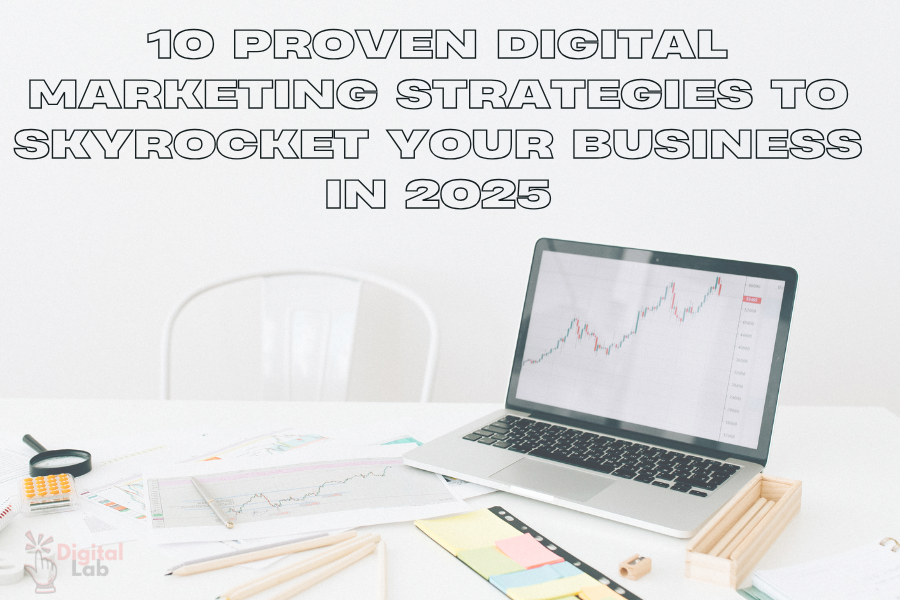In today’s fast-paced digital world, having a strong online presence is no longer optional—it’s essential. Whether you’re a startup or an established business, leveraging the right digital marketing strategies can help you reach your target audience, boost brand visibility, and drive conversions. At Digital Lab, we specialize in crafting innovative and data-driven marketing solutions tailored to your business needs. Here are 10 proven strategies to help your business thrive in 2025. Master Search Engine Optimization (SEO) SEO is the backbone of digital marketing. By optimizing your website for search engines, you can rank higher on Google, attract organic traffic, and generate quality leads. Focus on: Keyword research and implementation On-page SEO (meta tags, headers, alt text) Off-page SEO (backlinks, guest blogging) Technical SEO (site speed, mobile-friendliness) At Digital Lab, we use advanced tools and techniques to ensure your website ranks at the top of search results. Leverage Pay-Per-Click (PPC) Advertising PPC campaigns, such as Google Ads and social media ads, offer instant visibility and measurable results. With precise targeting, you can reach your ideal audience and maximize ROI. Our team at Digital Lab creates high-converting PPC campaigns tailored to your budget and goals. Create High-Quality Content Content is king! From blog posts and videos to infographics and eBooks, valuable content establishes your authority and keeps your audience engaged. Our content marketing experts at Digital Lab craft compelling stories that resonate with your audience and boost your brand’s credibility. Optimize for Local SEO If you’re a local business, optimizing for local SEO is crucial. Claim your Google My Business listing, gather reviews, and use location-based keywords. Digital Lab ensures your business stands out in local searches, driving foot traffic and online inquiries. Embrace Email Marketing Email marketing remains one of the most effective ways to nurture leads and retain customers. Personalize your emails, segment your audience, and track performance metrics. At Digital Lab, we design email campaigns that deliver results. Embrace Email Marketing Email marketing remains one of the most effective ways to nurture leads and retain customers. Personalize your emails, segment your audience, and track performance metrics. At Digital Lab, we design email campaigns that deliver results. Utilize Influencer Marketing Partnering with influencers can amplify your brand’s reach and credibility. Identify influencers who align with your brand values and collaborate on campaigns that drive results. Digital Lab connects you with the right influencers to elevate your marketing efforts. Analyze and Optimize with Data Data-driven decisions are key to successful digital marketing. Use tools like Google Analytics to track performance, identify trends, and optimize your strategies. At Digital Lab, we provide detailed analytics reports and actionable insights to keep your campaigns on track. Stay Ahead with Emerging Trends The digital marketing landscape is constantly evolving. Stay ahead by adopting emerging trends like AI-powered marketing, voice search optimization, and interactive content. Digital Lab keeps you updated with the latest innovations to ensure your business stays competitive. Digital marketing is a powerful tool to grow your business, but it requires expertise and a strategic approach. At Digital Lab, we combine creativity, technology, and data to deliver exceptional results. Whether you need SEO, social media management, or a full-fledged marketing strategy, we’ve got you covered. Contact Digital Lab today and let’s create a winning digital marketing plan together! Explore our services at www.digital-lab.in or schedule a free consultation to see how we can transform your digital presence. Let’s grow your business, one click at a time!
10 Proven SEO Strategies to Improve Your Website’s Ranking in 2025
In today’s digital world, having your website rank high on search engines is crucial. Search Engine Optimization (SEO) can seem complex, but with the right strategies, you can significantly improve your website’s visibility and ranking. Here are 10 proven SEO strategies to help you get started in 2025: Quality Content is King: High-quality, informative content engages users and encourages them to spend more time on your site. Regularly update your blog or website with valuable content that meets the needs and interests of your audience. Mobile Optimization: Ensure your website is mobile-friendly. With more people using mobile devices to browse the internet, search engines prioritize mobile-optimized sites. Keywords and Phrases:Use relevant keywords and phrases naturally throughout your content. Conduct keyword research to find terms your target audience is searching for. Avoid keyword stuffing, as it can negatively impact your ranking. Optimize Page Speed: A fast-loading website improves user experience and reduces bounce rates. Use tools like Google PageSpeed Insights to analyze and enhance your site’s speed. Meta Tags:Use effective meta tags, including title tags, meta descriptions, and header tags. These elements provide search engines with information about your content and improve your click-through rates. Backlinks: Earn backlinks from reputable websites. Backlinks act as endorsements for your site, boosting your credibility and ranking. Focus on creating shareable content to attract natural backlinks. User Experience (UX): Ensure your website is easy to navigate and user-friendly. A clear, logical structure and intuitive design enhance user experience and encourage return visits. Regularly Update Content: Fresh content is favored by search engines. Update your existing content and add new posts regularly to keep your site relevant and engaging. Social Media Integration: Promote your content on social media platforms to increase visibility and drive traffic to your website. Social signals can positively impact your search engine ranking. Monitor and Analyze: Use SEO tools like Google Analytics to track your website’s performance. Regularly analyze your data to identify areas for improvement and adjust your strategies accordingly. By implementing these 10 proven SEO strategies, you’ll be well on your way to improving your website’s ranking in 2025. Stay proactive, keep learning, and adapt to the ever-changing SEO landscape to maintain your competitive edge.
Top 10 Digital Marketing Trends to Watch in 2025
As the digital landscape evolves, staying ahead of the curve is crucial. Here are the top 10 digital marketing trends to watch in 2025: Artificial Intelligence (AI) and Machine Learning (ML) : AI and ML are transforming digital marketing by providing insights into customer behavior, predicting trends, and personalizing experiences. From chatbots to predictive analytics, these technologies enhance efficiency and effectiveness. Voice Search Optimization: With the rise of smart speakers and voice assistants, optimizing for voice search is a must. This means focusing on natural language and long-tail keywords to capture voice queries and improve search rankings. Visual and Video Content: Videos and visual content continue to dominate. Platforms like YouTube, TikTok, and Instagram Reels are essential for engaging audiences. Short-form videos, behind-the-scenes clips, and visual storytelling are key strategies. Content Personalization: Tailoring content to individual preferences boosts engagement. By leveraging data and AI, marketers can create personalized experiences, from customized emails to targeted ads. Influencer Marketing 2.0: Influencer marketing is evolving. Micro-influencers and nano-influencers are gaining traction due to their niche audiences and higher engagement rates. Authenticity and transparency are critical in influencer partnerships. Augmented Reality (AR) and Virtual Reality (VR): AR and VR are creating immersive experiences, from virtual product try-ons to interactive advertisements. These technologies offer innovative ways to engage customers and enhance brand interactions. Privacy and Data Security: With increasing regulations and consumer awareness, prioritizing privacy and data security is essential. Transparent data practices and compliance with privacy laws build trust and protect user information. Shoppable Posts and Social Commerce: Social media platforms are becoming shopping hubs. Shoppable posts and social commerce features allow users to purchase directly from social media, streamlining the shopping experience. Interactive Content: Quizzes, polls, surveys, and interactive infographics engage users and encourage participation. Interactive content not only entertains but also provides valuable insights into customer preferences. Sustainability and Ethical Marketing: Consumers are increasingly valuing sustainability and ethical practices. Brands that promote eco-friendly products and socially responsible initiatives resonate with conscious consumers.
How to Optimize Your Website for SEO: A Complete Beginner’s Guide
If you’re new to digital marketing or want to improve your website’s search engine visibility, SEO (Search Engine Optimization) is the key to driving organic traffic. Optimizing your website for SEO can be daunting, but with the right strategies, you can start seeing significant improvements in your website’s ranking on search engines like Google. In this complete beginner’s guide, we’ll walk you through the essential steps to optimize your website for SEO, helping you boost your visibility, attract more visitors, and increase conversions. Understand What SEO Is SEO refers to the practice of optimizing your website so that it ranks higher on search engine results pages (SERPs). When users search for relevant terms, you want your website to appear at the top of their search results. SEO involves several key elements, including content optimization, keyword research, site structure, technical SEO, and backlinks. One of the best SEO tools is SEMrush. It’s highly regarded for its comprehensive features, including keyword research, rank tracking, site audit, and competitor analysis. SEMrush helps you find profitable keywords, optimize your content, and track your website’s performance, making it a go-to for many SEO professionals. Conduct Thorough Keyword Research Keyword research is the foundation of any successful SEO strategy. By identifying the words and phrases your target audience is searching for, you can create content that matches their intent. How to do keyword research: Use Keyword Tools: Tools like Google Keyword Planner, SEMrush, or Ahrefs allow you to find keywords related to your business or niche. Look for terms with high search volume and low competition. Consider Long-Tail Keywords: These are more specific phrases that often have lower competition but can drive highly targeted traffic to your site. For example, instead of just “SEO,” use “how to optimize my website for SEO.” Analyze Competitors: Look at the keywords your competitors are ranking for and identify any gaps in their content that you can fill. Optimize Your Website’s On-Page SEO On-page SEO refers to all the elements on your website that you can optimize to improve search engine rankings. These include: Title Tags: Ensure each page of your website has a unique title tag that includes your target keyword. Keep it under 60 characters. Meta Descriptions: The meta description summarizes your content in search results. Include your main keyword and make it compelling enough to encourage clicks. Headings (H1, H2, H3, etc.): Use heading tags to structure your content and make it easier for both users and search engines to understand. Your main keyword should ideally appear in the H1 tag. URL Structure: Keep your URLs short, descriptive, and keyword-rich. For example, use “yourwebsite.com/seo-guide” instead of “yourwebsite.com/page1”. Internal Linking: Link to other relevant pages or blog posts on your website to create a strong internal linking structure that helps search engines crawl your site. Image Optimization: Compress images for faster loading speeds and add alt text that describes the image content, using relevant keywords. Improve Your Website’s Technical SEO Technical SEO ensures that search engines can crawl, index, and understand your website. Here are a few key technical aspects to focus on: Mobile Optimization: Ensure your website is mobile-friendly, as Google uses mobile-first indexing. Use responsive design so your website adapts to any screen size. Page Speed: Page load time is a critical ranking factor. Tools like Google PageSpeed Insights can help identify ways to improve your site’s speed. Compress images, minify code, and leverage browser caching. SSL Certificate (HTTPS): Google considers HTTPS a ranking signal. Make sure your website has an SSL certificate to secure user data and improve trustworthiness. XML Sitemap: Create and submit an XML sitemap to Google Search Console. This helps search engines understand your site structure and find all the pages on your website. Fix Crawl Errors: Use Google Search Console to identify crawl errors and resolve issues that prevent search engines from indexing your pages. Create High-Quality, Relevant Content Content is king in SEO. When you publish high-quality, informative, and engaging content, you increase the chances of your website ranking well. Tips for creating SEO-friendly content: Focus on User Intent: Create content that answers questions or solves problems your target audience is facing. Use Keywords Naturally: Integrate keywords naturally throughout your content, but avoid keyword stuffing. Aim for readability and flow. Include Multimedia: Use images, infographics, videos, and other multimedia to enhance your content and make it more engaging. Content Length: While there’s no magic number, long-form content (1,000+ words) often performs better in search rankings because it tends to be more comprehensive and detailed. Update Regularly: Keep your content up to date with the latest information to maintain relevance and improve SEO performance. Build Quality Backlinks Backlinks are links from other websites to your own. Google views backlinks as “votes of confidence” in your content. The more high-quality backlinks you have, the higher your chances of ranking well. Ways to build backlinks: Guest Blogging: Write guest posts for reputable websites in your industry, linking back to your site. Create Shareable Content: Develop content that is valuable and likely to be shared by others, such as how-to guides, infographics, or case studies. Engage in Social Media: Sharing your content on social media can lead to natural backlinks from other websites or bloggers. Build Relationships with Industry Influencers: Collaborate with influencers or experts in your field who may link to your content. Track Your Progress and Adjust SEO is not a one-time task; it’s an ongoing process. Use tools like Google Analytics and Google Search Console to track your website’s performance, keyword rankings, and traffic. Monitor your rankings, analyze traffic patterns, and adjust your SEO strategy as needed. Regularly update old content, fix broken links, and keep improving your website’s SEO to stay competitive. Optimizing your website for SEO is essential for attracting organic traffic and growing your online presence. By focusing on keyword research, on-page SEO, technical SEO, content creation, and building backlinks, you can improve your chances of ranking higher on search engines and driving more qualified visitors to




